Education & AI: Navigating the future of learning
Published in Seminars and WorkshopsSaturday, March 9, 2024, 9:00 - 14:30
(Registration opens at 8:30)
Anatolia College, Kassandra Center
This conference is designed for educators of all levels and disciplines who are interested in exploring how to harness the power of AI to transform the landscape of education.
We recognise that teachers play a key role in defining the future and rapidly evolving digital media are creating new challenges to the learning process. The workshops offered can empower teachers, equipping them with tools and strategies that will improve their process and facilitate their work.
Open to educators of all levels and disciplines, as well as students, researchers and other members of the educational community. A certificate of attendance will be provided to all participants.
Parking space available.
Schedule
8:30 - 9:00 Registration & Morning Coffee
9:00 - 9:15 Welcome
9:15 - 10:15 Keynote speech
10:15 - 10:30 Questions - Discussion
10:30 - 10:45 Presentation of workshops
10:45 - 11:00 Coffee break
11:00 - 12:30 Workshops: 1st part
12:30 - 13:00 Lunch break
13:00 - 14:30 Workshops: 2nd part
Keynote speaker
 Vincent C. Mueller
Vincent C. Mueller
Vincent C. Mueller is Alexander von Humboldt Professor and Director of the "Centre for Philosophy and AI Research" (PAIR) at Friedrich-Alexander University, Erlangen-Nuremberg, Germany. He works mainly on ethical and philosophical problems connected to artificial intelligence.
Towards AI-ethics with method: Encompassing and minimal
It is now frequently observed that there is no proper scope and no proper method in the discipline of AI-ethics. This has become an issue in the development towards maturity of the discipline, e.g. canonical problems, positions, arguments, etc to secure steps forward. We propose a minimal, yet universal view of the field. Given this proposal, we will know the scope and the method, and we can appreciate the wide set of contributions.
This keynote speech will be in Greek.
Workshops
1. Artificial Intelligence Integration in Primary Education
Instructors: George Arnaoutis & Efstratia Lambridou
This workshop aims to introduce educators to Artificial Intelligence by exploring how it can be integrated into Primary Education. Educators will familiarize themselves with innovative tools, appropriate techniques, and interactive activities, enabling them to incorporate Artificial Intelligence into the educational process and enhance their teaching. Special emphasis will be placed on the practical application of ideas and dialogue is encouraged among participants.
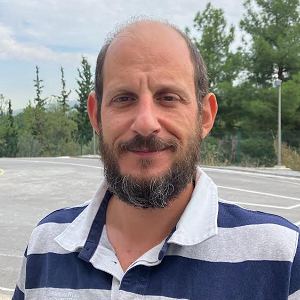 George Arnaoutis has been working since 2007 as an Educational Technology Officer at Anatolia College in Thessaloniki. He is dedicated to supporting the teaching staff in the design and implementation of interactive learning activities enriched with technology. Remaining informed about current trends in educational technology, George actively explores emerging interactive technologies and designs strategies for their integration into both traditional and innovative educational environments. As a Computer Science teacher from September 2008 until today, George teaches Computer Science at Anatolia Elementary School. His educational background includes a degree in Balkan Studies from the Aristotle University of Thessaloniki, a postgraduate degree in Information Systems from the University of Macedonia, and a Master's in Business Administration from the American College of Thessaloniki. Additionally, George is a certified Microsoft trainer in Information and Communication Technologies.
George Arnaoutis has been working since 2007 as an Educational Technology Officer at Anatolia College in Thessaloniki. He is dedicated to supporting the teaching staff in the design and implementation of interactive learning activities enriched with technology. Remaining informed about current trends in educational technology, George actively explores emerging interactive technologies and designs strategies for their integration into both traditional and innovative educational environments. As a Computer Science teacher from September 2008 until today, George teaches Computer Science at Anatolia Elementary School. His educational background includes a degree in Balkan Studies from the Aristotle University of Thessaloniki, a postgraduate degree in Information Systems from the University of Macedonia, and a Master's in Business Administration from the American College of Thessaloniki. Additionally, George is a certified Microsoft trainer in Information and Communication Technologies.
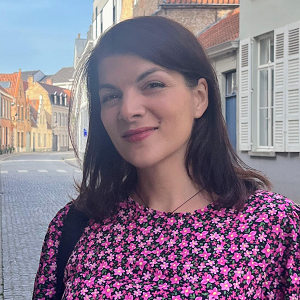 Efstratia Lampridou received her first bachelor's degree in Computer Science from the Department of Informatics at Aristotle University of Thessaloniki in 2008. Subsequently, she obtained two postgraduate diplomas - one in Information Systems from the same department and another in Computational Techniques & Software Engineering from Cranfield University in the United Kingdom in 2010. During her studies, her research interests focused on the field of Artificial Intelligence, and she presented two papers at the European Conference on Artificial Intelligence (ECAI '08) and the Hellenic Conference on Artificial Intelligence (SETN ‘08), respectively. From 2008 to 2009, she worked as a Computer Science instructor in various educational institutions. In 2010, she began working as a software engineer at a software company, where she remained until 2016, designing and developing applications for computers and mobile devices. Since September 2016, she has been a faculty member at Anatolia Elementary School, serving as a Computer Science teacher.
Efstratia Lampridou received her first bachelor's degree in Computer Science from the Department of Informatics at Aristotle University of Thessaloniki in 2008. Subsequently, she obtained two postgraduate diplomas - one in Information Systems from the same department and another in Computational Techniques & Software Engineering from Cranfield University in the United Kingdom in 2010. During her studies, her research interests focused on the field of Artificial Intelligence, and she presented two papers at the European Conference on Artificial Intelligence (ECAI '08) and the Hellenic Conference on Artificial Intelligence (SETN ‘08), respectively. From 2008 to 2009, she worked as a Computer Science instructor in various educational institutions. In 2010, she began working as a software engineer at a software company, where she remained until 2016, designing and developing applications for computers and mobile devices. Since September 2016, she has been a faculty member at Anatolia Elementary School, serving as a Computer Science teacher.
2. AI for Educators: First steps towards an AI-enhanced reality
Instructor: George Rouvas
In this workshop, secondary education teachers will develop a solid understanding of Artificial Intelligence and explore its practical applications in education. The workshop will begin with an examination of how Large Language Models like Chat GPT work, their inherent flaws and extraordinary capabilities, and how they have jump started and continue to fuel the AI revolution. Following this introduction, a set of carefully curated AI tools will be presented to the participants. In the final part of the workshop, participants will have the opportunity to actively experiment with the proposed tools and decide for themselves on their usefulness and applicability in their own teaching.
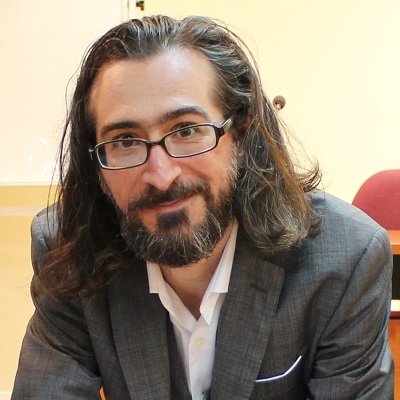 George Rouvas is a Computer Science teacher at Anatolia College. He is also the School’s Instructional Design Officer, his role being the design, implementation and support of the introduction of educational technology in all of the organization’s tiers (primary, secondary, tertiary).
George Rouvas is a Computer Science teacher at Anatolia College. He is also the School’s Instructional Design Officer, his role being the design, implementation and support of the introduction of educational technology in all of the organization’s tiers (primary, secondary, tertiary).
Mr. Rouvas has participated in numerous EU and nationally funded research projects that involve the design and development of digital educational games, applications and platforms. He has a number of publications and scientific conference presentations in areas of pedagogical interest like the use of creative writing and ICTs in education, game-based learning and STEM education, topics in which he regularly designs and administers training seminars.
3. Chat GPT as a tool for educators and students: a critical approach
Instructor: Dr. Tsampika Karakiza-Papatheranou
In the context of the workshop, participants will have the opportunity to initially understand what Artificial Intelligence is, its operating principles, and its contemporary applications. Various practices will be utilized for this purpose, including the exchange of ideas and the formation of a conceptual map. In connection with the Chat GPT environment, educators will experiment with indicative uses of artificial intelligence to familiarize themselves under structured guidance. Through organized activities, they will identify characteristics of the Chat GPT environment related to its role, effectiveness, reliability, and other parameters. Subsequently, participants, either individually or in groups, will propose scenarios for educational applications that are presented and discussed. In the final part of the seminar, the advantages and disadvantages of Artificial Intelligence will be highlighted, and specific limits and constraints will be emphasized, with a focus on its educational utilization.
 Tsampika Karakiza-Papatharenou is an Electrical and Computer Engineer, a professor of Computer Science affiliated with the Department of Communication and Media Studies at the National and Kapodistrian University of Athens. She is also a research collaborator at the Laboratory of Communication and Media Psychology in the same department. Her doctoral thesis in Communication is titled: "The transformation of the pedagogical relationship in the networked classroom: A qualitative investigation of the relationship between students and teachers in high school." She has taught at the Department of Education at the University of the Aegean and at the Pedagogical School of ASPAITE. Additionally, she has served as an adult educator in various organizations.
Tsampika Karakiza-Papatharenou is an Electrical and Computer Engineer, a professor of Computer Science affiliated with the Department of Communication and Media Studies at the National and Kapodistrian University of Athens. She is also a research collaborator at the Laboratory of Communication and Media Psychology in the same department. Her doctoral thesis in Communication is titled: "The transformation of the pedagogical relationship in the networked classroom: A qualitative investigation of the relationship between students and teachers in high school." She has taught at the Department of Education at the University of the Aegean and at the Pedagogical School of ASPAITE. Additionally, she has served as an adult educator in various organizations.
She has worked as a school counselor for computer science educators for two terms and as the head of scientific and pedagogical guidance for secondary education in the South Aegean prefecture. She is a professor-advisor at the Hellenic Open University (EAΠ) in the thematic unit "Digital World and Psychological Development." Her research focus is on the pedagogical utilization of digital media in education. She is the author of the book "Looking at the screen, touching the keys: Transformations of the pedagogical relationship in the networked environment."
4. Exploiting Artificial Intelligence in teaching philological and linguistic subjects
Instructor: Dr. Dimitris Koutsogiannis
The widespread use of Artificial Intelligence (AI) interactive environments, such as Chat GPT and Bard, has already sparked extensive discussions in the media and intense reflection in scientific literature regarding how they can or cannot be utilized in education. However, efforts focusing on everyday teaching practices are almost nonexistent. This is precisely the goal of this workshop: to shift the discussion from a general, typically tool-oriented discourse to what this evolution implies for schools, especially in the teaching of philological and linguistic subjects. The questions that will concern us in this workshop are: Are these environments genuinely new or not compared to other proposals/discussions regarding the use of digital technologies in (language) education? Can they be creatively utilized in school classrooms, and with which criteria? How can they be critically approached by the educational community and based on what criteria? How can they be understood in relation to broader developments of our time?
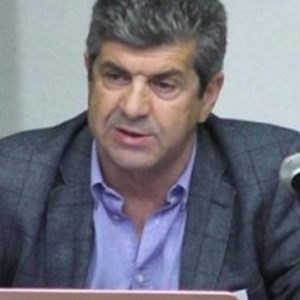 Dimitris Koutsogiannis is a professor of Educational Linguistics in the Linguistics Department of Aristotle University of Thessaloniki. He served as a philologist in Secondary Education for twenty years. His research interests and publications are related to the teaching of Greek as a first and second language, Educational Discourse Analysis, Critical Discourse Analysis, Sociolinguistics, teacher education, and digital literacies. Since 1997, he has been a collaborator at the Center for Greek Language, responsible for the development of linguistic digital resources (e.g., "Gateway to the Greek Language," "Proteas") and the director of the "Support and Promotion Department of the Greek Language." Since 2005, he has also been a collaborator of ITYE-Diophantus, responsible for the training of philologists in the pedagogical use of digital technologies. He is a co-founder of the international special interest group "Technology and Literacy Education," which belongs to the "International Research Association for Literacy Education" (ARLE) (https://www.arle.be/).
Dimitris Koutsogiannis is a professor of Educational Linguistics in the Linguistics Department of Aristotle University of Thessaloniki. He served as a philologist in Secondary Education for twenty years. His research interests and publications are related to the teaching of Greek as a first and second language, Educational Discourse Analysis, Critical Discourse Analysis, Sociolinguistics, teacher education, and digital literacies. Since 1997, he has been a collaborator at the Center for Greek Language, responsible for the development of linguistic digital resources (e.g., "Gateway to the Greek Language," "Proteas") and the director of the "Support and Promotion Department of the Greek Language." Since 2005, he has also been a collaborator of ITYE-Diophantus, responsible for the training of philologists in the pedagogical use of digital technologies. He is a co-founder of the international special interest group "Technology and Literacy Education," which belongs to the "International Research Association for Literacy Education" (ARLE) (https://www.arle.be/).
5. Using Artificial Intelligence to design and implement STEM activities in Elementary and High School
Instructor: Christos Vonapartis Kosmidis
In this workshop, participants will acquire practical knowledge in the field of designing educational activities with the assistance of artificial intelligence, drawing inspiration from real projects as they develop plans for their own STEM activities. By combining machine learning with existing technologies, they will enrich teaching approaches with AI applications tailored to the school environment.
Initially, they will explore types of machine learning through practical examples, using tools such as Teachable Machine and Lobe. They will create their own machine learning models, gaining a practical understanding of their application. They will compare machine learning with human learning, will discuss how artificial intelligence can complement human cognitive processes and will identify opportunities to integrate their understanding as educators in the field of human learning into machine learning applications.
Participants will incorporate artificial intelligence into the design and development of STEM projects using Chat GPT as a supporting tool. They will use examples that integrate the language model into STEM projects, following the design cycle. Participants will create their own activity plans working in groups with the support of Chat GPT.
They will explore educational activities that incorporate Artificial Intelligence technologies, which can enhance existing learning tools. The workshop will use integrated activities as examples, and new activities will be designed that will combine artificial intelligence with widely used technologies.
 Christos Vonapartis Kosmidis is an educator and STEAM facilitator at Pinewood American International School. With 15 years of teaching experience in public schools and Pinewood School, his focus is on incorporating cutting-edge technologies, such as 3D Printing, robotics, and A.I. applications into Primary and Secondary School Curricula. He has mentored student teams excelling in national and international technology and innovation competitions. Concurrently, he is pursuing doctoral research in cognitive science at Aristotle University of Thessaloniki and has published his work in Scientific Journals and Conferences. Christos believes that the most productive way for the development of an educator is by exchanging ideas and experiences with fellow teachers.
Christos Vonapartis Kosmidis is an educator and STEAM facilitator at Pinewood American International School. With 15 years of teaching experience in public schools and Pinewood School, his focus is on incorporating cutting-edge technologies, such as 3D Printing, robotics, and A.I. applications into Primary and Secondary School Curricula. He has mentored student teams excelling in national and international technology and innovation competitions. Concurrently, he is pursuing doctoral research in cognitive science at Aristotle University of Thessaloniki and has published his work in Scientific Journals and Conferences. Christos believes that the most productive way for the development of an educator is by exchanging ideas and experiences with fellow teachers.
6. Tools Powered by Artificial Intelligence (AI) Towards the Evolution of Education
Instructor: Pantelis Kaplanoglou
This workshop can be attended by an educator regardless of specialization and level. It aims to provide learning of useful software tools for the evolution of courses, alongside understanding of the scientific field of Machine Learning.
In recent years this specific branch of Artificial Intelligence – AI has given us innovative tools that support the human intelligence required for teaching, such as: Dialog agents for researching topics and summarizing text, intelligent translators, composers/solvers of Natural Science exercises, speech to text transcribers, sound/image/video creators, plagiarism detectors and other tools of academic integrity, evaluator/coaches for improving presentations.
Leveraging these tools, as well as saving time, could help gamify the lesson and evolve it towards personalized learning.
 Pantelis Kaplanoglou is a Machine Learning Architect and PhD candidate at the International Hellenic University in Explainable Machine Learning, with an M.Sc. in Web Intelligence. He teaches the course “Applied Machine Learning and Deep Neural Networks” at the American College of Thessaloniki (ACT) along with courses on software development, having taught in the past other Computer Science topics at IHU.
Pantelis Kaplanoglou is a Machine Learning Architect and PhD candidate at the International Hellenic University in Explainable Machine Learning, with an M.Sc. in Web Intelligence. He teaches the course “Applied Machine Learning and Deep Neural Networks” at the American College of Thessaloniki (ACT) along with courses on software development, having taught in the past other Computer Science topics at IHU.
Has worked for two decades in the computer and software industry, before switching to academic research and teaching. Over the past 5 years he has participated in the successful completion of 3 research projects in the fields of Computer Vision for UAV, Big Data Recommender Systems and Natural Language Processing/Understanding for Theater. Pantelis is currently participating in the EU Horizons project” Μanolo - Trustworthy Efficient AI for Cloud-Edge Computing”.
7. Strategies, techniques and examples of prompting in Chat GPT based bots
Instructor: Dr. Dimitris Sotiropoulos
Knowledge of specific techniques on how to compose your own part of a conversation (prompting) with a bot on websites that use generative artificial intelligence using natural language (such as Chat GPT) can significantly aid in receiving a more effective response.
In the 3-hour interactive workshop, participants will learn about and apply a range of prompting strategies and techniques (role prompting, chain of thought, self-consistency, etc.) in their own domain through examples and tests. This experience can be an important asset for the specialized use of Chat GPT-based tools to search for information and create new material, now and in the future.
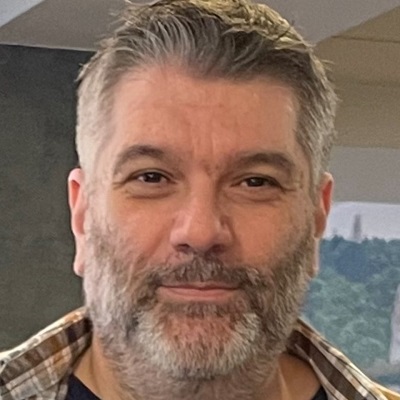 Dr. Dimitris Sotiropoulos is a physicist with a master’s degree in science education and a Ph.D. in Digital Educational Technology in Science Education. His research interests include exploring the -learning beneficial- integration of any form of digital technology into the educational process.
Dr. Dimitris Sotiropoulos is a physicist with a master’s degree in science education and a Ph.D. in Digital Educational Technology in Science Education. His research interests include exploring the -learning beneficial- integration of any form of digital technology into the educational process.
He has worked as a physics educator and a trainer in new technologies for over twenty years, and currently, he is an Academic Collaborator at the European University Cyprus in the field of "Technologies in STEAM Education." Previously, he taught courses for six years in the "Informatics in Education" field at the University of Thessaly.


